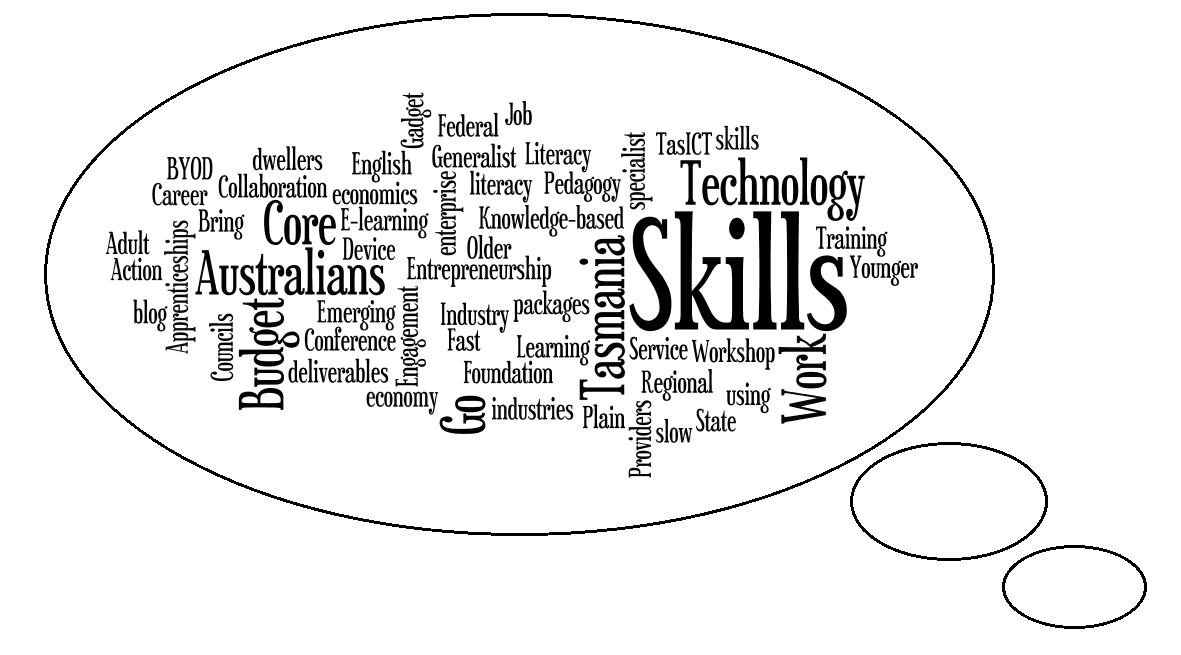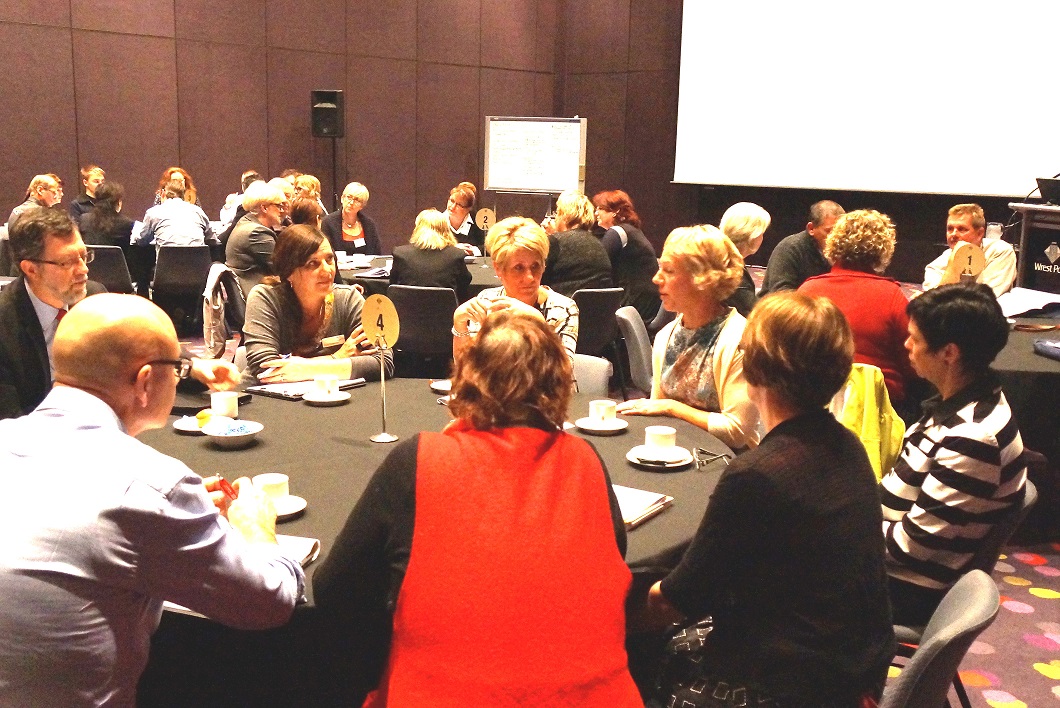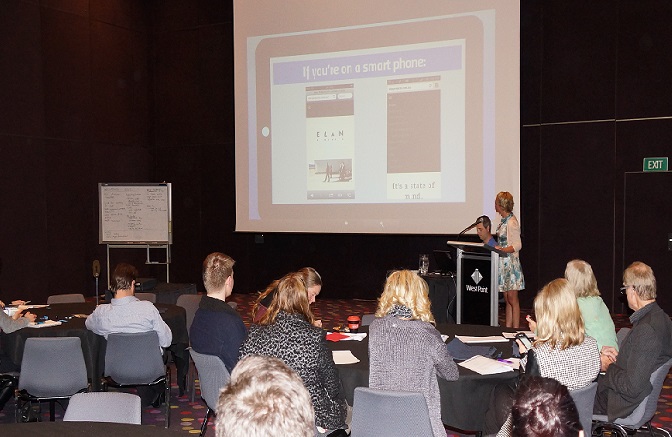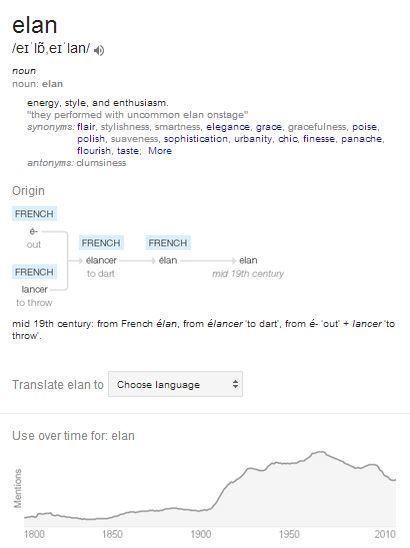We are abuzz after an invigorating two days spent listening, thinking and talking about the “whys” and “hows” of Vocational Education & Training, in a changing industrial, social, technological and political scene. Linden and I left the 2014 Skills Tasmania Conference last week with our brains brimming. It was a diverse and action-packed program, filled with challenging and inspiring ideas.

A (not-very-artistic) impression of the inside of my head at about 5pm last Tuesday as we packed up our booth at the end of the conference:
I hosted a table at Cafe Conversation to discuss the IT’s Your Career project, which we’re managing for TasICT . It was a treat to discuss the project with a range of new and old faces from all areas of VET. People shared their knowledge and experience, asking insightful questions and offering valuable ideas for the next program. We can’t wait to kick off Round 2 in readiness for 2015 at the TasICT Conference on August 14.

Lively conversations about all things VET-related at the Cafe Conversations session. (Photograph thanks to Chris Johnston).
In the somewhat eerie vacuum between the hand-down of the Federal and State budgets (does anyone else feels like we’re in the eye of the storm?), the conference was aptly themed “Riding the wave – it’s all about…”.
The name calls to mind the surfing sensation of paddling out beyond the breakers, eyes on the horizon, looking for a good position and being ready to use the energy of the best waves, as the sets come through. I hope that our Vocational Education and Training (VET) sector is busily waxing up its boards in preparation for a swift ride into a vastly different landscape. Certainly, the size of our state, our ready access to broadband, the burgeoning digital start-up scene, as well as Tassie’s exciting tech projects means that there is a groundswell of momentum building – we just need to be ready to paddle like mad to get onto that wave! But, I’d best stop wearing out the metaphor and get on with it…
This blog post is an attempt to distill “hows” and “whys” – the key themes, impressions and lessons that we picked up from the conference into some “whats” – what does it all mean? what could we try? what do we need?
Since the conference, I have been pondering this central question:
“How can we skill Tasmanians for a knowledge-based & rapidly-changing economy?”
The big hits – key themes & discussion points
Please feel welcome to comment below and let me know what I got right, and where I’ve you think I’ve missed the point.
-
We need nimble and agile workers
All four of us at Elan share the conviction that Tasmania has the potential to enjoy an exciting future as an incubator of global tech and start up innovation in sustainable and knowledge-based industries. This sentiment was echoed in several of the presentations. Professor John Buchanan and Dr Marcus Bowles both spoke about a need to look carefully at imparting strong general core competencies, to foster solid values and attitudes and to build an agile workforce that can apply its skills in a variety of contexts. I was too shy in the Plenary Hall (believe me, it does happen) to pipe up and ask them where the Core Skills For Work Framework and Employability Skills fit into this picture, but the illustrations that they used pointed at the importance of tacit skills and personal attributes that can be applied across industries and sectors as the nature of business changes.
I’m keen to discover how they would suggest that the VET sector goes about developing the values and attitudes that John and Marcus discussed in their presentations, which both sought to highlight the need to inspire a ‘can-do’, enterprising, empathetic, innovative and confident attitude in the workforce of the future. I did have a quick chat to Marcus about the conundrum of how to teach values and attitudes, rather than skills and knowledge. He stressed the importance of careful recruitment of workers and imparting an understanding of “why I do my job” (not just “what I do in my job”) when training workers. If you’re interested in the tension between “will” and “skill” – or values vs. skills & knowledge, you might want to watch this film in which the incomparable Sir Ken Robinson discusses the need for a creative and innovative approach to education:
The clear challenge for the VET sector is to redefine the way that we educate. We have to work at responding to a shift away from “vocations” towards “job roles”, and to serve our rapidly-evolving local industries. We’re going to need to be bold and innovative to deliver the diverse array of skills and knowledge that people now need in order to be productive and successful participants in the labour market. Skills Tasmania’s Skills Fund has been a uniquely responsive, demand-driven funding model, allowing employers to catalogue the discrete skills required to meet a demonstrated enterprise need and find training partners that can deliver them. I really like this funding model. It keeps industry need at the core of its focus, irrespective of the training package or qualification from which the Units of Competency come. I hope we will see more funding of this kind, both on a State and Federal level. I predict that this more flexible model will gain further recognition as the diversity and variety of skills needed to do modern jobs becomes better understood.
What do you think: Is it too far-fetched to hope that we could see partnerships between multiple specialist Registered Training Organisations to deliver specialist training solutions for niche businesses? Imagine that…
-
Strong Foundation Skills in our community are everyone’s business
I wouldn’t be surprised if people are tiring of hearing me raving about our dire need for all Tasmanians to have strong Foundation Skills. If Tasmania is to capitalise on it’s natural, social and technological resources and to grow our emerging industries that largely rely on specialist expertise, Adult Literacy (by which I am referring to the core skills relating to Learning, Communicating, Literacy, Digital Literacy and Numeracy) must be our top priority.
Linden and I attended an excellent workshop about Plain English, hosted by the inspired and passionate people from the 26TEN strategy. Ms Jen Dunbabin from Skills Tasmania used the analogy that Plain English opens doors to understanding, where using slang, acronyms and unnecessarily vague language locks people out. Ms Robin Black, who is the Strategy Manager, explained that there are two important aspects to the strategy:
– improving everyone’s core skills (check out the Australian Core Skills Framework if you haven’t already – it’s great)
– promoting the use of Plain English right across the community so that we can all “meet in the middle”. It seems that we’re aiming for a “sweet spot” between raised literacy levels and clarified written language.
We also agreed that de-stigmatising having weak Foundation Skills is a vital aspect of dealing with the issue. Just as Beyond Blue helped Australians get past the notion that Depression was weird or scary, allowing us to move forward in seeking treatment and building social acceptance, 26TEN seeks to promote the issues around adult literacy in a positive, matter-of-fact way.
The lesson for me from the workshop is I am a repeat offender, using word play and novel words to entertain (mainly myself). In doing so, I probably lose most of my audience. The workshop was a good reminder and I hereby undertake to try harder to be clear. Feel free to ping me with an “Acronym Alert” if you catch me using acronyms unfairly! We’re looking to involve the Digital Start Up community of freelancers in Tasmania to participate in some Plain English training to grow our skills in the area. Watch out for the workshop dates if you’re keen.
-
Digital literacy for everyone is crucial

Delegates joined in the fun at the Go Go Gadget workshop, participating in live polls on their own devices. (Photograph thanks to Chris Johnston).
Linden and I presented the Go Go Gadget workshop, where we presented the outputs from our National VET E-learning Strategy (NVELS) research project entitled “Guidelines for the Effective Use of Bring Your Own Device in VET”. We showcased the Guidelines themselves, the online BYOD Readiness Self Audit Tool and the other outputs from the project, which included a Brief Builder, Sample Policies and four Case Studies about best practice in BYOD around Australia. They are all hot off the press and still awaiting uploading to the NVELs site. For now, you can find them on our Workshops page if you’re keen to learn more about introducing Bring Your Own Device practice into your organisation. For us, the fun was in demonstrating live BYOD applications throughout the session. We’re really thankful to the great numbers of delegates who came along, joined in the live polls throughout the workshop and had the good manners to laugh (either at me or with me) in the right spots.
The workshop was Linden’s first public outing on Elan business and he acquitted himself with, well, elan. As usual, Linden used his magic IT skills to make the computers say “yes”, and despite a complex set of tech challenges, all of the gadgets chose to play nicely on the day. Feedback was excellent and we were thrilled to get an email from a delegate who had come all the way from Wodonga TAFE who said “This was a great session. Learning in action.” We set out to illustrate the opportunities presented by using digital tools for live engagement and are delighted that it worked!
Many people came to our booth and discussed a need for general and specialist digital literacy in a modern workforce with us. Conversations yielded examples of productivity and efficiency drivers for using technology cleverly in delivery and assessment. Lots of people also highlighted the equity and access aspects of the digital literacy and we agree that access to digital tools and the confidence to use them well is a social justice issue.
People were wondering whether Elan is working with people and digital literacy, and yes, we sure are. We’re constantly seizing opportunities to innovate, extend and improve skills through applying technology in a fit-for-purpose way. Further to the Foundation Skills issue that I discussed above, I frequently find that using technology can give us a chance to work around Language, Literacy and Numeracy deficiencies and just get on with the job at hand.
We love teaching people about using technology. We also love to teach people, using technology.*
-
We need to foster an entrepreneurial, enterprising state of mind in our workforce for the future
There was much fascinating conversation about “enterprise” (the noun), versus “enterprise” (the verb), and what it takes to teach people to think in an “enterprising” fashion. Another educational challenge that frequently emerged in conversation is developing individuals to behave in a way that is industrious, shows initiative, ambition, conviction and a willingness to take a calculated risk. People with these skills and this mindset make ideal workers and entrepreneurs. They are vital to invigorate our economy. Are these skills inherent? Or can they be taught?
Elan is keen to determine and document the competencies and knowledge necessary for success in Start-Up businesses and we are plotting an exciting initiative to do that with the freelance and Digital Start-Up community in Tasmania.
Were you wondering about the depressing title that I chose for this post?
It seems to me that the real risk that we all face is providing education that does not deliver the right kind of learning. We are all aware that our productivity, participation and numeracy and literacy are in crisis at this point in time, so clearly, something needs to change.
Conferences are a great time to think about why we teach, how we can teach and what needs to be taught. The challenge for us all is to lift our gaze towards a shared vision for the future, to ask the tough questions about what needs to change. We need the courage to take the bold steps towards redefining how we deliver and fund vocational education and training (or, as I prefer to call it “learning for work”) in a way that will serve our vision. In this way, we won’t let the education get into the way of the learning.
So, I end this epic-length post with these comforting words from the Elan mascot (is it disrespectful to call the great Professor Einstein a mascot?):
“Learn from yesterday, live for today, hope for tomorrow. The important thing is not to stop questioning.” – Albert Einstein
Till next year, thanks everyone for a great conference and I look forward to learning what you all thought about the event.
Cheers,
Nina
* I’m doubtful that that statement would stack up against a Plain English test. What do you think?


Recent Comments